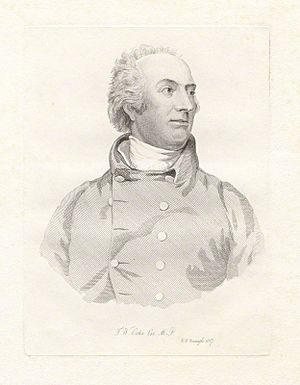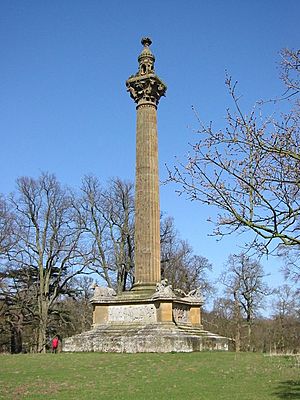Thomas Coke, 1st Earl of Leicester (seventh creation) facts for kids
Quick facts for kids
The Earl of Leicester
|
|
|---|---|
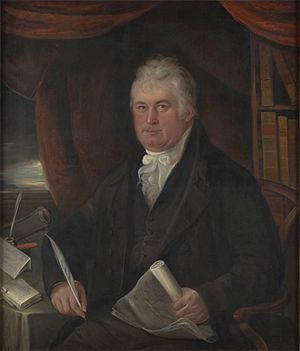 |
|
| Member of Parliament for Norfolk |
|
| In office 1807–1832 |
|
| Preceded by | Edward Coke |
| Succeeded by | Constituency abolished |
| Member of Parliament for Derby |
|
| In office 1807 |
|
| Preceded by | Edward Coke |
| Succeeded by | Edward Coke |
| Member of Parliament for Norfolk |
|
| In office 1790–1807 |
|
| Preceded by | Sir Edward Astley, 4th Baronet |
| Succeeded by | Edward Coke |
| Member of Parliament for Norfolk |
|
| In office 1776–1784 |
|
| Preceded by | Wenman Coke |
| Succeeded by | John Wodehouse, 1st Baron Wodehouse |
| Personal details | |
| Born |
Thomas William Coke
6 May 1754 London |
| Died | 30 June 1842 (aged 88) Longford, Derbyshire |
| Nationality | British |
| Political party | Whig |
| Spouses | Jane Dutton (1753–1800), Anne Keppel (1803–1844) |
| Children | with Jane Dutton:
|
| Parents | Wenman Coke Elizabeth Chamberlayne |
| Residence | Holkham Hall |
Thomas William Coke, 1st Earl of Leicester (6 May 1754 – 30 June 1842), also known as Coke of Norfolk, was an important British politician and a leader in farming improvements. He was born into a wealthy family in London. After finishing school and traveling Europe, he inherited a huge 30,000-acre estate in Norfolk.
Coke became a Member of Parliament (MP) in 1776. He was a close friend of the politician Charles James Fox. Coke supported the American colonists during the American Revolutionary War. He lost his seat in Parliament in 1784 but returned in 1790 and served until 1832. He often spoke about local issues and civil liberties.
Coke is famous for his work in farming. He is often given credit for starting the British Agricultural Revolution because of the changes he made on his farms. While some historians say others also helped, he is still called "the real hero of Norfolk agriculture." He retired from Parliament after the Great Reform Act 1832 was passed and became the Earl of Leicester in 1837. He died in 1842, and his son Thomas took over his title.
Contents
Early Life and Education
Thomas William Coke was born in London on May 6, 1754. His father, Wenman Coke, was a Member of Parliament for Derby. This meant Thomas grew up in a rich family that owned a lot of land.
When Thomas was five, his family's future got much brighter. His great-uncle, Thomas Coke, 1st Earl of Leicester, passed away. This meant that when his great-uncle's wife, Margaret, died, Thomas's father would inherit a huge estate in Norfolk. This included Holkham Hall, a beautiful mansion. Margaret tried to live longer than Wenman so he wouldn't get the estate, but she died in 1775, just one year before Wenman inherited it.
Thomas went to school in Longford, Derbyshire, and then to a school in Wandsworth. In 1765, he went to Eton College, a famous school, where he became friends with William Windham. Thomas enjoyed sports at Eton more than his studies. After Eton, in 1771, he went on a "Grand Tour" of Europe, visiting France and Italy. While in Italy, he met Princess Louise of Stolberg-Gedern, who was married to the "Young Pretender". She reportedly liked Thomas, who was closer to her age, more than her 52-year-old husband!
Political Career
When Thomas returned to Britain, there were already plans for him to join Parliament. In 1774, his father ran for the Norfolk seat, and Thomas was asked to run for Derby. Thomas wasn't very keen and had to withdraw because he was under 21, the age needed to be an MP.
After his father was elected, Thomas went to London and met many important people. He fell in love with Jane Dutton, his sister's husband's sister. His father wasn't happy at first, as he had someone else in mind for Thomas to marry. But with help from a friend, his father agreed, and Thomas and Jane married on October 5, 1775.
Joining Parliament
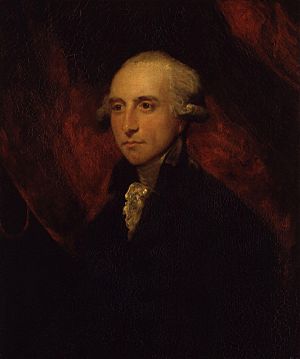
In 1776, Thomas's father became ill and died. At just 22, Thomas was now in charge of a 30,000-acre estate. Soon after, important Whig politicians asked him to take his father's place in Parliament for Norfolk. Thomas wasn't excited about politics, but he agreed when they warned him that a Tory might take the seat instead. He was elected in May.
Thomas became very good friends with Charles James Fox, a famous Whig politician. Thomas said, "When I first went into Parliament I attached myself to Fox and clung to him through life."
During this time, the American Revolution began. Thomas strongly supported the American colonists. He believed it was his duty to support justice and freedom, both in Britain and abroad. In 1778, after the Battles of Saratoga, it was clear the war in America would be long and costly. King George III asked people to donate money for the war. Thomas and his friend William Windham attended a meeting in Norwich for this purpose. Windham gave a powerful speech, saying the war had only brought "disappointment, shame and dishonour." He argued that "peace and reconciliation with America" was the only way.
Thomas and his friends then wrote a petition to the King from the people of Norfolk, signed by 5,400 people. Thomas presented this to Parliament. King George III took this as a personal insult and disliked Thomas from then on.
Thomas also spoke about hunting laws. These laws made it very hard for people to hunt unless they owned land, and punished poachers severely. Thomas, who loved hunting, suggested these laws should be made less strict.
In 1782, Lord North resigned, and a new government was formed. After some political changes, the Fox-North Coalition was created in 1783. Thomas was not happy with this alliance. A new bill about India caused more problems, and King George III used it to remove Fox's government. Parliament was dissolved in 1784, and because of Thomas's strong support for Fox, he lost his seat in the election.
Improving His Estates
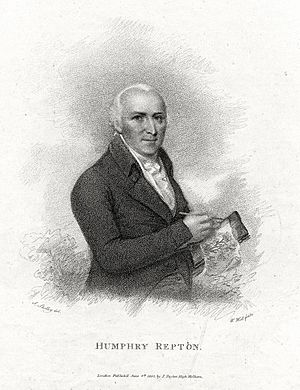
Even while in Parliament, Thomas and his wife worked hard to improve his estates, especially Holkham Hall. This grand house was built by his great-uncle. Thomas focused on the park and gardens around the house.
He greatly expanded the lake, moving huge amounts of earth. He hired gardeners who planted over 7,000 trees in one area and many more across the estate. Between 1785 and 1789, nearly 400,000 trees were planted! He also expanded the library and added new buildings like lodges and a kitchen garden. By 1810, most of this work was done.
Thomas also loved hunting. The estate was designed for it, and records show thousands of partridges were hunted each year. In 1822, his daughter Elizabeth noted that 800 birds were shot in just one day.
Thomas's wife, Jane Dutton, had three daughters: Jane (born 1777), Anne Margaret (born 1779), and Elizabeth (born 1795). Jane Dutton died in 1800. His daughter Jane married Charles Nevison Howard, Viscount Andover, but he died in a hunting accident on the Holkham estate in 1800. She later remarried and had many children.
Farming Innovations
As a landlord, Thomas believed it was his duty to improve the lives of people on his land. Landlords provided fields and buildings, while tenants provided seeds and labor. When Thomas inherited his estate, it had 54 farms, but also large debts.
He made big improvements in farming. In the early 18th century, farms often used an "open field system" where land was shared. Thomas quickly bought up strips of land near his estates and had them "enclosed" (fenced off into private fields). Enclosed farms were better for trying new farming methods and brought in more money.
Thomas was inspired by ""Turnip" Townshend," who promoted crop rotation (changing crops each year to keep the soil healthy) and other improvements.
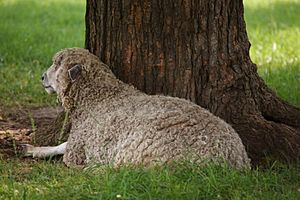
Thomas's main improvements were in growing better grasses and raising animals. He was a pioneer in using grasses like cocksfoot and lucerne for animal feed. This helped him increase his sheep from 700 to 2,400 by 1793.
He also experimented with different types of cows and was the first to plant Scottish turnips, which were tastier and more nutritious than the local Norfolk kind. His most important work was in selectively breeding sheep. The local sheep, the Norfolk Horn, grew slowly. Thomas promoted the English Leicester, a breed that grew quickly. He cross-bred the two, creating a superior, calmer sheep. He also bred cattle and used oxen for ploughing instead of horses, winning an award for his oxen in 1837.
Thomas shared his new ideas and breeds through "sheep shearings." These started as small gatherings of local farmers but grew into large dinners with hundreds of people, including important guests like the American ambassador. He also became Vice-President of the Board of Agriculture, which published reports on new farming methods across the country.
Even though his land was sandy and poor, Thomas is called "the real hero of Norfolk agriculture." While some historians say others also contributed to the farming changes, they agree that Thomas made a big difference in improving farming techniques in England.
Later Political Years
Thomas was re-elected to Parliament in 1790. This was a time of great political unrest because of the French Revolution. Thomas and Fox were among the few who supported the revolutionaries, even as their actions became violent. When war broke out in 1793, farming prices went up in Britain. Thomas initially opposed local defense forces, which made some people in Norfolk suspect he was a Jacobin (a radical supporter of the French Revolution). He had to publicly state he was not a Republican. Eventually, he formed and commanded the Holkham Yeoman Cavalry to defend against invasion.
Thomas continued to support Fox and spoke out against the war in Parliament. He was more interested in local issues, especially those affecting farmers. He argued against new land taxes and tried to shorten the hunting season to allow more corn to be grown.
He was re-elected in 1796, even though his anti-war message was seen as arrogant. After William Pitt died in 1806, the Whig groups formed a government called the Ministry of All the Talents. Thomas was offered a peerage (a noble title), but he refused. This government focused on ending slavery, which happened after Fox's death in 1806. Fox's death made Parliament less appealing to Thomas, as they were close friends.
After the defeat of Napoleon in 1815, soldiers returned home, causing unemployment and economic problems. Thomas actively opposed tax increases that would hurt farmers. He spoke out against income and malt taxes and criticized property tax as against civil liberty. He also opposed government spending. In 1817, he spoke about the King's efforts to limit freedom of speech and the press, suggesting the government needed to change.
In 1818, he returned to Parliament and argued against a bill about Royal Households. After the Peterloo Massacre, where peaceful protesters were attacked, Thomas accused the government of being involved.
In the 1820s, Thomas spoke less in Parliament. This was partly because the Tory party dominated, and partly because he remarried. In 1822, at 68, he married Anne Keppel, his 18-year-old godchild. Their marriage was surprising to many, but they had a son, Thomas, born later that year.
In 1831, his friend Earl Grey became Prime Minister. Thomas became more active in Parliament. He was very happy about the Great Reform Act 1832, which changed how elections worked. He chose the passage of this act on June 4, 1832, as the right time to retire as an MP. After being offered a noble title six times before, he finally accepted one in July 1837, becoming the Earl of Leicester. However, he didn't enjoy the House of Lords, calling it "the hospital for incurables."
His Final Years
Thomas remained active even after retiring. At 79, he was still a skilled hunter. He died on June 30, 1842, at the age of 88, after a short illness. His last words were reportedly, "well, perhaps I have talked too much."
His funeral was a huge event. Thousands of people came to pay their respects. The procession was two miles long, led by 150 tenants on horseback, followed by hundreds of carriages and gentlemen. He was buried at the family tomb in Tittleshall on July 11. Soon after his death, a committee was formed to create a monument to him. Over a thousand people donated money, and the Coke Monument was completed in 1851 at Holkham Hall. His son Thomas inherited his title and the Holkham estate.
His Family
By his first wife Jane Dutton, he had three daughters:
- Lady Jane Elizabeth Coke (1777–1863)
- Lady Anne Margaret Coke (1779–1843)
- Lady Elizabeth Wilhelmina Coke (1795–1873)
With his second wife, Lady Anne Amelia Keppel, he had four sons and one daughter:
- Thomas William Coke, 2nd Earl of Leicester of Holkham (1822–1909)
- Capt. Hon. Edward Keppel Coke (1824–1889)
- Henry John Coke (1827–1916)
- Lt.-Col. Hon. Wenman Clarence Walpole Coke (1828–1907)
- Lady Margaret Sophia Coke (c. 1829–1868)
 | Bessie Coleman |
 | Spann Watson |
 | Jill E. Brown |
 | Sherman W. White |



